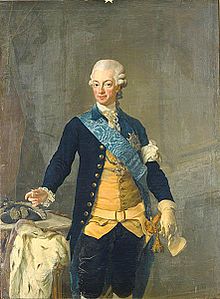- Swedish Constitution of 1772
-
Sweden's Constitution of 1772 (Swedish: regeringsform, "Instrument of Government") took effect through a bloodless coup d'état carried out by King Gustav III, who had become king in 1771, establishing a brief absolute monarchy in Sweden. This was a response to perceived harm wrought upon Sweden by a half-century of parliamentarism during the country's "Age of Liberty". The 1772 Constitution was criticised as authoritarian and in 1789 was amended in a still more autocratic direction by the Union and Security Act.
Formally, the 1772 Constitution was adopted by the Parliament (Riksdag) on 21 August 1772, but this took place after members of the Privy Council and the leading members of the Parliament had been arrested by the royal garrison on order by Gustav III.[1]
The 1772 Constitution replaced the Swedish Constitution of 1720 (which was fundamentally similar to the 1719 Constitution) and was in turn replaced by the 1809 Instrument of Government following the defeat in the Finnish War and the removal of king Gustav IV Adolf from the throne.[2]
Contents
Effects of War of Finland 1809
In the Grand Duchy of Finland, created in 1809 from the eastern third of Sweden as part of the Russian Empire, the amended 1772 Constitution was in force until 17 July 1919. In Sweden, the loss of Finland resulted in both a new royal dynasty (Jean-Baptiste Bernadotte being appointed successor to the throne) and a rewriting of the constitution, resulting in the new Instrument of Government, with more limited powers of the king.
See also
- Gustav III
- Constitution of Sweden
- Constitution of Finland
- Alexander I Grand Duke of Finland
- Diet of Porvoo
- Grand Duchy of Finland
- Russification of Finland
- Corsican Constitution
- Walhalla-orden
References
- ^ Gustaf III, Nordisk Familjebok (1909) (Swedish)
- ^ Regeringsformen, Nordisk Familjebok (1915) (Swedish)
External links
Categories:- 1772 in law
- 1772 in Sweden
- Political history of Sweden
- Political history of Finland
- Swedish constitutions
- Defunct constitutions
- Sweden-Finland
- Grand Duchy of Finland
- 18th century in Sweden
- Legal history of Sweden
- Legal history of Finland
- Finland stubs
- Swedish history stubs
Wikimedia Foundation. 2010.

